[Dec 2007, Volume 4 Quarterly Issue] Pdf File size - The IIPM Think ...
[Dec 2007, Volume 4 Quarterly Issue] Pdf File size - The IIPM Think ...
[Dec 2007, Volume 4 Quarterly Issue] Pdf File size - The IIPM Think ...
You also want an ePaper? Increase the reach of your titles
YUMPU automatically turns print PDFs into web optimized ePapers that Google loves.
FROM THE EDITOR’S DESK<br />
planning for competition, not by planning against competition<br />
Dear reader,<br />
After being shackled for nearly five<br />
decades, a <strong>size</strong>able class of ingenious private<br />
entrepreneurs have been fully liberated,<br />
at least in some economic spheres.<br />
<strong>The</strong>y are now exhibiting their true potential<br />
and international competitiveness as<br />
is reflected in the popular media. In this<br />
context, after perusing all those informative,<br />
yet disparate nuggets and given the<br />
fact that India boasts of a deep financial<br />
services sector, long standing and diversified<br />
private participation (relative to<br />
China, Brazil and other emerging economies),<br />
vibrant entrepreneurial class and<br />
Anglo-Saxon legal institutions, it may<br />
seem surprising that India still painfully<br />
needs a much more market-orientation<br />
across all levels. <strong>The</strong>re is still exists a robust<br />
economic reasoning which asserts<br />
that the state should disentangle all obstacles<br />
and disengage the past planning<br />
follies to release the creative, social and<br />
economic energies of the fast growing<br />
‘bottom millions’. Consider this: According<br />
to the Heritage Foundation’s Index of<br />
Economic Freedom (<strong>2007</strong>), India is only<br />
55.6 percent free. This score makes it the<br />
world’s 104th freest economy!<br />
In this issue of IER, many empirical<br />
research studies profess that, among<br />
other positive outcomes, economic freedom<br />
promotes national growth and poverty<br />
reduction. Furthermore, different<br />
research papers outline the processes and<br />
policy implications of business freedom,<br />
financial freedom and investment freedom<br />
in several areas, which specifically<br />
and importantly includes<br />
basic education,<br />
labour markets<br />
and financial markets.<br />
Unlike most other issues,<br />
IER this time<br />
covers not only business<br />
and economics,<br />
but also deals with<br />
important research<br />
submissions that falls<br />
outside the realm of traditional economics-<br />
such as intellectual property, ecology<br />
and environment, economic history and<br />
politics This issue, we have some original<br />
research and novel analysis about<br />
• Public governance, market, deprivation<br />
and the political system.<br />
• India’s growing ecological footprint<br />
• <strong>The</strong> international trade in higher education<br />
and implications for India.<br />
Prasoon.S.Majumdar<br />
Managing Editor<br />
M.N.V.V.K.Chaitanya<br />
Deputy Editor<br />
• Why poor parents are choosing ‘More<br />
Market, Less Government’ in education,<br />
and what we should do about it?<br />
• Accountable governance and pro-poor<br />
markets for poverty reduction<br />
• Reforms in the Indian banking sector<br />
and policy reversal<br />
• Economic freedom in India’s product<br />
and labour markets<br />
Above all, after reading all the opinions<br />
featured here in this issue, we at the<br />
<strong>IIPM</strong> <strong>Think</strong> Tank are of the firm opinion<br />
that, if we get a state that reflects more of<br />
what this country is actually about, India<br />
can indeed turn the century and its market--<br />
around, in the very near future. <strong>The</strong><br />
impressive response in areas that have<br />
been reformed in the recent past must<br />
give policymakers confidence that further<br />
liberalisation will eventually deliver additional<br />
growth dividends and foster the<br />
process of pulling millions of people out<br />
of poverty.<br />
Best,<br />
Prasoon.S.Majumdar<br />
M.N.V.V.K. Chaitanya


![[Dec 2007, Volume 4 Quarterly Issue] Pdf File size - The IIPM Think ...](https://img.yumpu.com/29766298/6/500x640/dec-2007-volume-4-quarterly-issue-pdf-file-size-the-iipm-think-.jpg)
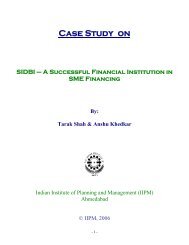
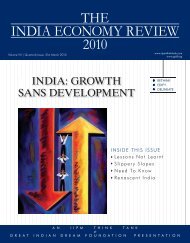
![[Feb 2008, Volume V Annual Issue] Pdf File size - The IIPM Think Tank](https://img.yumpu.com/43961117/1/190x245/feb-2008-volume-v-annual-issue-pdf-file-size-the-iipm-think-tank.jpg?quality=85)
![[June 2008, Volume V Quarterly Issue] Pdf File size - The IIPM Think ...](https://img.yumpu.com/41693247/1/190x245/june-2008-volume-v-quarterly-issue-pdf-file-size-the-iipm-think-.jpg?quality=85)
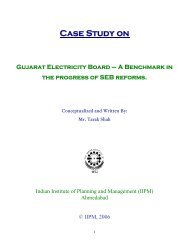
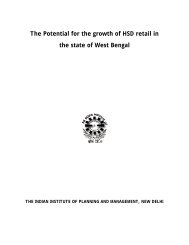
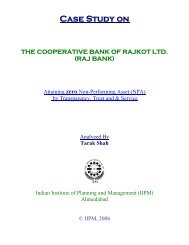
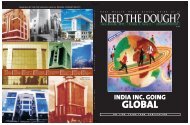
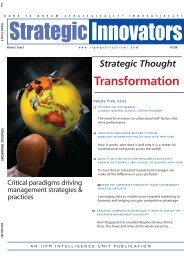
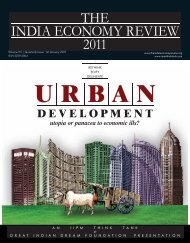
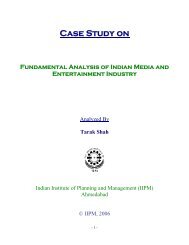
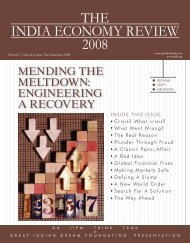
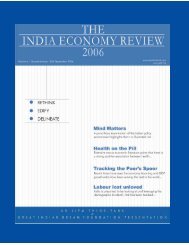
![[Volume VI | Quarterly Issue: 31st May 2009] Pdf File size](https://img.yumpu.com/27796051/1/190x245/volume-vi-quarterly-issue-31st-may-2009-pdf-file-size.jpg?quality=85)